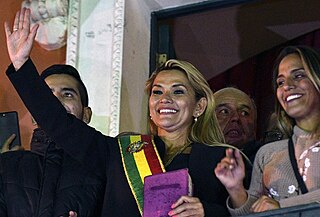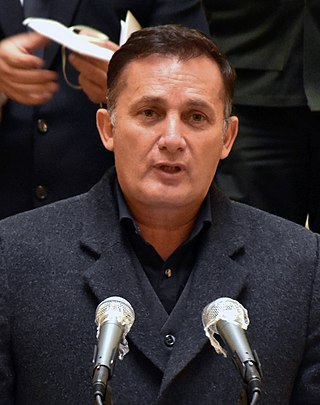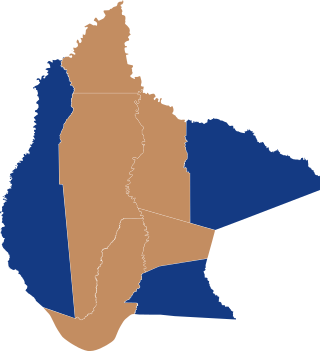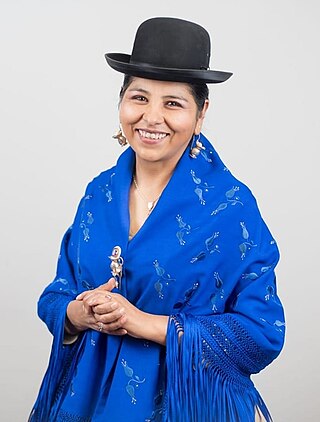Related Research Articles

The Ministry of Cultures, Decolonization, and Depatriarchalization is the ministry of the government of Bolivia that provides for the preservation and protection of the cultures and artistic expressions of the indigenous peoples of Bolivia as well as promotes the country's tourism sector and process of decolonization and depatriarchalization.

Luis Alberto Arce Catacora, often referred to as Lucho, is a Bolivian banker, economist, and politician serving as the 67th president of Bolivia since 2020. A member of the Movement for Socialism, he previously served as minister of finance—later minister of economy and public finance—from 2006 to 2017, and in 2019.

Adriana Salvatierra Arriaza is a Bolivian political scientist and politician who served as president of the Senate in 2019. A member of the Movement for Socialism, she served as senator for Santa Cruz from 2015 to 2020 and was a substitute senator for Santa Cruz under Carlos Romero in 2015. At age twenty-nine, Salvatierra was the youngest legislator and third woman to hold the presidency of the Senate and was the youngest individual to ever exert presidential authority, albeit briefly in an acting capacity.

A political crisis occurred in Bolivia on 10 November 2019, after 21 days of civil protests following the disputed 2019 Bolivian general election in which incumbent President Evo Morales was initially declared the winner. The elections took place after a referendum to amend the Bolivian constitution, which limits the number of terms to two, was rejected in 2016. In 2017, the Constitutional Tribunal (TCP) ruled that all public offices would have no term limits despite what was established in the constitution and allowing Evo Morales to run for a fourth term.

Jeanine Áñez Chávez is a Bolivian lawyer, politician, and television presenter who served as the 66th president of Bolivia from 2019 to 2020. A former member of the Social Democratic Movement, she previously served two terms as senator for Beni from 2015 to 2019 on behalf of the Democratic Unity coalition and from 2010 to 2014 on behalf of the National Convergence alliance. During this time, she served as second vice president of the Senate from 2015 to 2016 and in 2019 and, briefly, was president of the Senate, also in 2019. Before that, she served as a uninominal member of the Constituent Assembly from Beni, representing circumscription 61 from 2006 to 2007 on behalf of the Social Democratic Power alliance.

General elections were held in Bolivia on 18 October 2020 for President, Vice-President, and all seats in both the Senate and Chamber of Deputies. Luis Arce of the Movement for Socialism (MAS) party was elected president in a landslide, winning 55% of the vote and securing majorities in both chambers of the Plurinational Legislative Assembly. The results of the election superseded the disputed results of the October 2019 elections, which were annulled during a prolonged political crisis.

Mónica Eva Copa Murga is a Bolivian politician, social worker, and former student leader serving as mayor of El Alto since 2021. As a member of the Movement for Socialism, she previously served as senator for La Paz from 2015 to 2020, during which time she was president of the Senate from 2019 to 2020.

Rafael Arcángel Quispe Flores, often referred to as Tata Quispe, is a Bolivian indigenous activist and politician who served as general executive director of the Indigenous Development Fund from 2019 to 2020. He previously served as a substitute party-list member of the Chamber of Deputies from La Paz under María Eugenia Calcina from 2015 to 2019.

Rogelio Mayta Mayta is a Bolivian lawyer and politician who served as the Foreign Minister of Bolivia from 9 November 2020 to 15 November 2023 under the administration of Luis Arce.

Andrónico Rodríguez Ledezma is a Bolivian cocalero activist, political scientist, politician, and trade unionist serving as president of the Senate since 2020. A member of the Movement for Socialism, he serves as senator for Cochabamba. Rodríguez's lengthy career in the cocalero union hierarchy saw him serve as general secretary of the 21 September Workers' Center from 2015 to 2016 and as executive of the Mamoré Bulo Bulo Federation from 2016 to 2018, in addition to a multitude of other minor positions. He has served as vice president of the Coordination Committee of the Six Federations of the Tropic of Cochabamba since 2018 and held office as president of the organization from 2019 to 2020 in the absence of the body's longtime leader, Evo Morales.

Arturo Carlos Murillo Prijic is a Bolivian businessman, hotelier, and politician who served as the minister of government from 2019 to 2020. As a member of the National Unity Front, he previously served as a senator for Cochabamba from 2015 to 2019 and as a plurinominal member of the Chamber of Deputies from Cochabamba from 2006 to 2010.

Yerko Martín Núñez Negrette is a Bolivian agronomist and politician who served as minister of the presidency from 2019 to 2020. A member of the Social Democratic Movement, he previously served as minister of public works from November to December 2019. Throughout his ministerial tenure, Núñez was noted as a key person of influence in the transitional government and a "right-hand" to President Jeanine Áñez, a fellow Beni native. Prior to his appointment, he served as senator from Beni from 2015 to 2019 on behalf of the Democratic Unity coalition. As a member of Beni First, Núñez served as mayor of Rurrenabaque from 2010 to 2014; he previously held the position for two terms from 2000 to 2003 and 2005 to 2010 as part of the Revolutionary Nationalist Movement. Núñez's mayoral tenure saw strides made for Rurrenabaque's ecotourism industry, which generated increased economic growth for the city.

Luis Fernando López Julio is a Bolivian businessman, retired military officer, and politician who served as minister of defense from 2019 to 2020. Appointed in the tail end of the 2019 political crisis, López, along with Minister of Government Arturo Murillo, quickly became characterized as the "strong men" of the Jeanine Áñez administration and were implicated in the deadly events at Senkata and Sacaba. López was called to hearings by the Plurinational Legislative Assembly but failed to present himself three consecutive times, ultimately resulting in his censure by the legislature. As per the terms of the Constitution, he was dismissed as minister but, exploiting a loophole in the document's text, he was reappointed just a day later. Soon after, reports revealed his participation in the tear gas case, which accused the ministries of government and defense of irregularly purchasing non-lethal weapons at inflated prices.

The Arce Cabinet constitutes the 222nd cabinet of the Plurinational State of Bolivia. It was formed on 9 November 2020, one day after Luis Arce was sworn in as the 67th president of Bolivia following the 2020 general election, succeeding the Áñez Cabinet. The cabinet is composed entirely of members of the ruling Movement for Socialism. Described as a "technocratic" cabinet, it has been noted for the low-profile and youth of some of its members as well as its political distance from former president Evo Morales.
The 2019 Senkata massacre occurred when Bolivian soldiers and police broke up a road blockade at the YPFB gas facility in Senkata, El Alto, Bolivia, on 19 November 2019. It occurred one week into the interim presidency of Jeanine Áñez and four days after the Sacaba massacre. Rural and urban protesters had blockaded the plant shortly after the ouster of Bolivian president Evo Morales. Their protests were part of nationwide blockades by his supporters denouncing the ouster as a coup d'état, and urban protests in El Alto against the new government's desecration of the wiphala, an Indigenous flag designated a Bolivian national symbol by the 2009 Constitution. By 14 November, protesters had built barricades as part of their blockade.
Events from the year 2022 in Bolivia.

The 2021 Beni gubernatorial election was held on Sunday, 7 March 2021, to elect the governor of Beni, Bolivia. Alex Ferrier, the incumbent governor after the 2015 gubernatorial election but who resigned during the 2019 political crisis, ran to return to office for a second term. He was defeated by Alejandro Unzueta, who received a popular vote plurality of 41.79 percent—a margin of more than forty percent plus ten percent above the next closes competitor—allowing for a first-round victory without the need for a runoff.

Martha Yujra Apaza is a Bolivian politician and trade unionist who served as minister of cultures and tourism from 2019 to 2020. A prominent trade union leader in El Alto, Yujra was the only indigenous member of the Jeanine Áñez Cabinet and was the final official to head the Ministry of Cultures and Tourism; the institution was abolished during her term. During her tenure, Yujra's office primarily dealt with the effects of the COVID-19 pandemic on the cultural sector, devising means of alleviating the economic ramifications of quarantine measures on artisans and entertainers. She subsequently served as a counselor at the Embassy of Bolivia in Quito from July to November 2020. Prior to serving as minister, Yujra gained notoriety for her fierce opposition to the government of Evo Morales. In 2017, she led a breakaway faction of the pro-government El Alto Regional Workers' Center. As its executive secretary, Yujra aligned the union with the Bolivia Says No alliance, running unsuccessfully to represent La Paz in the Chamber of Deputies in the annulled 2019 general elections.

Bertha Beatriz Acarapi is a Bolivian politician and former television presenter serving as a party-list member of the Chamber of Deputies from La Paz since 2020. A member of the Movement for Socialism, she previously served as an El Alto municipal councillor from 2000 to 2004 on behalf of the Revolutionary Left Movement and from 2004 to 2010 on behalf of Plan Progress for Bolivia. During her second term, she served as president of the El Alto Municipal Council from 2006 to 2007, becoming the first woman to assume that post. Outside of politics, Acarapi's lengthy career in radio and television journalism led her to join ATB in 2015, becoming one of the country's first high-profile chola indigenous presenters.
The following is a chronology of notable events from the year 2023 in Bolivia.
References
- ↑ Ministerio de Comunicación de Bolivia (6 March 2017). "El Alto es la segunda ciudad con más población de Bolivia". Enlace. Retrieved 8 December 2019.
- 1 2 "Las 3 horas de terror que sufrieron en Senkata". La Razón. 2 December 2019. Retrieved 8 December 2019.
- 1 2 3 Garfias, Mazurek, Sandra, Hubert (2005). El Alto desde una perspectiva poblacional (PDF) (in Spanish). Consejo de Población para el Desarrollo Sostenible. ISBN 99905-0-884-4 . Retrieved 8 December 2019.
{{cite book}}: CS1 maint: multiple names: authors list (link) - ↑ "Distrito Municipal 8 - Equipamiento". 17 January 2016.
- ↑ "Áñez abroga decreto 4078 e insta a la reconciliación". Correo del Sur. 29 November 2019. Retrieved 8 December 2019.
- ↑ "RUTAS Y LONGITUDES DE LA RED FUNDAMENTAL" (PDF).
- ↑ "Militares toman Senkata para normalizar distribución de gasolina". ANF. 10 October 2016. Retrieved 8 December 2019.
- ↑ "Levantan el bloqueo en Senkata y se reanuda la venta de carburantes". Página Siete. 23 November 2019. Retrieved 8 December 2019.
- ↑ "Al menos un muerto en Senkata tras salida del convoy de combustible". El Periódico. 19 November 2019. Retrieved 8 December 2019.
- 1 2 "La parroquia que recibió la 'ofrenda del holocausto'" (in Spanish). La Razón. 2 December 2019. Retrieved 8 December 2019.
- 1 2 Rivas, Miguel (21 December 2013). "Cuatro hitos marcan el crecimiento urbano alteño" (in Spanish). La Razón. Retrieved 8 December 2019.
- ↑ "Senkata, el barrio minero de Bolivia que se rebeló contra la clase política" (in Spanish). El Deber. 8 December 2019. Retrieved 8 December 2019.
- ↑ "Alto La Florida, un barrio que nació tras la "relocalización"" (in Spanish). Correo del Sur. 29 January 2018. Retrieved 8 December 2019.
- ↑ "Los Mineros, el barrio que surgió con la relocalización, Bolivia" (in Spanish). OutletMinero. Retrieved 8 December 2018.
- ↑ "Octubre, el inicio de una historia" (in Spanish). Página Siete. 31 March 2018. Retrieved 8 December 2019.
- ↑ Farfán, Williams (17 October 2014). "Octubre de 2003, aquella masacre que cobró 81 vidas" (in Spanish). La Razón. Retrieved 8 December 2019.
- ↑ "Senkata: Siete acusados por terrorismo pasan a la cárcel" (in Spanish). 20 November 2019. Retrieved 8 December 2019.
- ↑ "El Gobierno ve actos de terrorismo en Senkata, donde murieron por lo menos 3 personas" (in Spanish). 20 November 2019. Retrieved 8 December 2019.
- ↑ "La CIDH investiga la masacre de Senkata en El Alto" (in Spanish). Miradas del Sur. 26 November 2019. Retrieved 8 December 2019.
- ↑ Jiménez Pereyra, Alfredo (7 December 2019). "¿Quiénes dispararon en Sacaba y Senkata?" (in Spanish). Los Tiempos. Retrieved 8 December 2019.
- ↑ Ramos, Daniel; Limachi, Santiago (21 November 2019). "Supporters of Bolivia's Morales march with coffins of dead protesters". Reuters. Retrieved 9 December 2019.
- ↑ Defensoría del Pueblo Bolivia (21 November 2019). "DEFENSORÍA DEL PUEBLO CONFIRMA QUE LAS 8 PERSONAS FALLECIDAS EN SENKATA MURIERON POR IMPACTO DE ARMA DE FUEGO" (in Spanish). Retrieved 8 December 2019.
- ↑ Peñaranda U., Raúl (19 November 2019). "Con el fantasma de octubre de 2003, militares y policías lograron desbloquear Senkata" (in Spanish). Brújula Digital. Retrieved 8 December 2019.
- ↑ "Alteños recordarán sucesos violentos de octubre de 2003" (in Spanish). Los Tiempos. 11 October 2014. Retrieved 8 December 2019.
- ↑ "Crisis en Bolivia: la presidenta interina Jeanine Áñez promulga la ley para convocar nuevas elecciones sin Evo Morales como candidato" (in Spanish). BBC. 24 November 2019. Retrieved 8 December 2019.
- ↑ "Decreto sobre las Fuerzas Armadas genera polémica" (in Spanish). Opinión. 17 November 2019. Retrieved 8 December 2019.
- ↑ "Bolivia: qué dice el decreto firmado por Jeanine Áñez sobre la actuación de las Fuerzas Armadas que se viralizó en las redes sociales" (in Spanish). Infobae. 16 November 2019. Retrieved 8 December 2019.
- ↑ "A 13 años del recorrido del 'convoy de la muerte'" (in Spanish). Eju.tv. 11 October 2016. Retrieved 8 December 2016.
- ↑ "Bolivia: Decreto Supremo Nº 27209, 11 de octubre de 2003". Levivox.
- ↑ "Sánchez Berzaín dice que todo el gabinete de Goni firmó el decreto del convoy" (in Spanish). Urgente.bo. 14 March 2018. Retrieved 8 December 2019.
- ↑ "DECRETO SUPREMO Nº 4078JEANINE AÑEZ CHÁVEZPRESIDENTA CONSTITUCIONAL DEL ESTADO PLURINACIONAL DE BOLIVIA" (PDF).
- ↑ "Añez abroga el Decreto 4078 que eximía de responsabilidad penal a FFAA" (in Spanish). Los Tiempos. 28 November 2019. Retrieved 8 December 2019.
- ↑ "Áñez aprueba decreto que exime a militares de cualquier responsabilidad penal". Opinión. 16 November 2019. Retrieved 8 December 2019.
- ↑ Véliz, Rafael (29 November 2019). "Áñez abroga decreto 4078 y dice que se logró la pacificación del país". El Deber. Retrieved 8 December 2019.
- ↑ "Barrios Florida Senkata y Primavera Juntuhuma estrenan vías enlosetadas". Agencia Municipal Informativa. 2 December 2019. Retrieved 8 December 2019.
- ↑ Chuquimia Huallpa, marco antonio (November 2019). "Los vecinos de El Alto denuncian abusos para obligarlos a marchar". El Deber. Retrieved 8 December 2019.
- ↑ "Conductor atropella a una guardia de transporte en la ex Tranca de Senkata". El Alto es noticia. 3 October 2019. Retrieved 8 December 2019.
- ↑ "Comunidad de El Alto".
- ↑ Quisbert, Carlos (24 November 2019). "Un universitario es la novena víctima de violencia en Senkata". Página Siete. Retrieved 8 December 2019.
- ↑ "Continúan las filas en espera de gas licuado". Página Siete. 22 November 2019. Retrieved 8 December 2019.